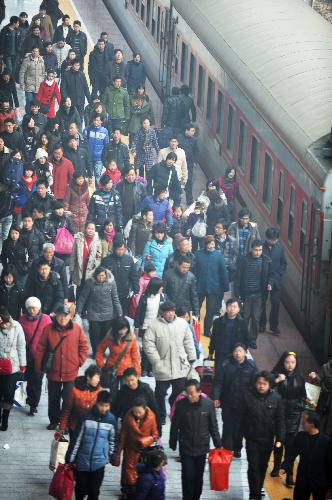Migrant workers return home with new year hope
Cui Tongming, a migrant farmer working in eastern Jiangsu Province, carrying five suitcases full of gifts for family and friends at a small village in central Jiangxi Province, was waiting for his train with his wife and daughter.
Although the 10-hour trip on hard seats was tiring, the farmer was happy to be going home for the Spring Festival holiday, with more than 15,000 yuan (2,197 U.S. dollars) he earned over the past nine months.
About 152 million migrant workers like Cui will travel home in the transport peak season from Jan. 30 to March 10, during which the Lunar New Year will fall on Feb. 14, the most important traditional festival for family reunion.
The large number of traveling migrant workers every year indicates more working and money-making opportunities in big cities and the still existing development gap between urban and rural areas, said Ou Minggang, director of the international finance department of the Beijing-based China Foreign Affairs University.
Cui returned to his mountain village earlier than expected last year, like many of his fellow villagers and millions of migrants working in coastal areas. The shoe factory where he worked in the southern Guangdong Province was closed due to a slump in overseas orders.
"The journey home is almost the same every year, but I am in a different mood compared with last year. I had lost hope of earning any money then but I had to support my parents and young daughter," said the 41-year-old construction worker.
Millions of Chinese migrant workers returned home from eastern and southern cities, the country's export powerhouses, at the end of 2008 and the start of 2009, as factories closed or slashed production due to waning exports caused by the global economic slowdown.
"I like working in Suzhou, as I can stay close to my wife and daughter and I can get food pay," Cui said.
The recovery of the country's economy since the second quarter led to rising demand for construction workers, office building cleaners, express couriers and others.
China has become the first country in the world to show a V-shape economic recovery, due to the government stimulus package. Its gross domestic product (GDP) grew 8.7 percent in 2009 after quickening to 10.7 percent in the last quarter.
It also helped to land Cui a job as a bricklayer in Suzhou, a city famous for its electronics, textile and chemical industries and almost 800 kilometers from his home village.
"My wife, Zhang Meiling, has been working in this city for two decades and is serving as a gate guard for a local primary school. She told me that I might find a new job here as the city was full of vigor and I did get one at a construction site in April. The pay was better than my job in Guangdong a year ago," Cui said.
"When I first came to Suzhou to work in a textiles firm 20 years ago, my salary was half that of local residents. Now I can get equal pay and insurance like other support staff at the school. This gives me a feeling of being at home," Zhang said.
What offered the couple an even stronger "feeling of home" was that their 17-year-old daughter could sit in a local public high school and was on good terms with her city-born classmates.
Millions of migrants are enjoying an increasingly better work environment and an improving social security net as the government is stepping up efforts to help migrant workers find jobs in cities or towns near their villages to get access to a better life.
"The construction project has been completed, and my team head has helped me and other colleagues find another construction job in Suzhou next year. Our family would come back after the Spring Festival and we hope for a better life next year," Cui said.
 0
0 







